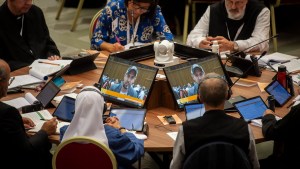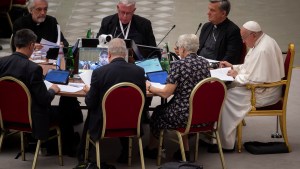“How to be a missionary synodal Church” is the big question posed by the Instrumentum laboris (IL) published this July 9, 2024. This is the “working document” which is intended to guide the work of participants in the second assembly of the Synod on Synodality next October. It calls for new processes of participation to be devised and for the development of ministries for the laity, particularly for women.
A progress report for October
As in the previous “working document” (published on June 20, 2023), the editors of this text recall that this document, as a working document ahead of the XVI Synod assembly next October, has no magisterial value. Rather, it’s intended as a further step in the long three-year synodal process launched on October 9, 2021.
The General Secretariat of the Synod, which is responsible for drafting the text, explains that it based the document first and foremost on what emerged during the first synodal assembly in October 2023, gathered together in the synthesis report that was published at the end of that assembly.
The text is also strengthened by 108 reports written in 2024 by bishops’ conferences and various ecclesial bodies. It also takes into account over 200 comments sent in by movements, institutions, and individuals taking part in the process.
The document further incorporates the reflections made by several working groups this year: those of parish priests who met in Italy last April-May, those of members of five groups of theologians set up by the Synod secretariat, and those of a commission of experts in canon law.
The drafters of the document include a group of theologians as well as members and consultants of the Synod’s general secretariat. The first version was sent to some 70 people — priests, lay people, religious men and women — from all over the world, who commented on the text and proposed changes. This consultation led to corrections and a new version, which was approved by the Synod’s general secretariat and then presented to Pope Francis, who also gave his assent.
Marking progress and noting the need for participation
The avenues suggested throughout the 31 pages and 111 articles of the IL will all have to be studied by all the participants in the next Synod assembly, unlike the previous assembly where the synod fathers were divided into thematic groups.
The text notes progress in the understanding and use of the terms “synod” and “synodal.” It does not, however, gloss over the “non-participation of so many members of the People of God,” a reality which, it stresses, “remains an obstacle to a full renewal of the Church in a missionary synodal sense.”
Refocusing on the mission
From a formal point of view, this second IL does not take the same form chosen by the previous version — that of an abundant list of questions. In a sign of a certain tightening of focus, the text’s editors insist that we “cannot expect the answer to every question.”
They also point out that Pope Francis has removed some topics from the Synod’s discussions, entrusting them to 10 study groups which are due to deliver their work in June 2025 — but will present a progress report at the October assembly.
Certain matters have been ruled out, such as the diaconate or priestly ordination for women, and the marriage of priests. The issue of polygamy will also not feature in the debates, as this is being dealt with at continental level. A “special Commission to discern the theological and pastoral implications of polygamy for the Church in Africa” was set up by the Symposium of Episcopal Conferences of Africa and Madagascar on April 25, the text informs.
The question of welcoming LGBT people and the issue of sexual orientation is no longer explicitly mentioned, but reference is made to “people who, for different reasons, are or feel excluded or on the margins of the ecclesial community or who struggle to find full recognition of their dignity and gifts within it.”
The participants of the synod are asked a single major question, which is the title of the working instrument: “How to be a missionary synodal Church?”
“Synodality is not an end in itself,” the text stresses, but should enable Catholics “to proclaim the Gospel in the most appropriate way to women and men of every place and time,” not least by offering them a witness of unity.
Women in positions of responsibility
“[T]o give fuller recognition to the charisms, vocation and role of women, to better honor this reciprocity of relations in all spheres of the Church’s life” has been one of the Synod’s leitmotifs since it began. In this area, the IL proposes avenues of reflection for concrete reforms, saying “more active participation of women in all ecclesial spheres is needed. As Pope Francis states, their perspective is indispensable in decision-making processes and in the assumption of roles in the different forms of pastoral care and mission.” According to the writers, this point is explicitly requested by many bishops’ conferences.
The text also calls for women to have access to and employment in positions of responsibility in dioceses, as well as in seminaries, institutes, and theological faculties, and for an increase in the number of women judges in canonical processes.
Inclusion as teachers and formators
Other avenues outlined by the Synod include the participation of women in formation programs alongside clerics, and women’s access to teaching and training positions in theological faculties and institutes, and in seminaries. It also envisages offering “formation to make them aware of the roles and tasks women can already perform in the Church.”
To promote the place of women, the organizers suggest using “language that is more inclusive” and “images drawn from Scripture and Tradition in preaching, teaching, catechesis and the drafting of official Church documents.”
On the other hand, the possible opening of the diaconate to women — one of the subjects that caused debate among the members of the October 2023 session — “will not be the subject” of the work of the second session. The IL points out theological reflection on this topic will continue in the study group set up by the Pope.
Francis himself has already closed this door, clearly ruling out the possibility of ordaining women deaconesses, in an interview with the American channel CBS last May.
Developing lay ministries
According to the IL, reflection on the role of women highlights “the desire to strengthen all the ministries exercised by the laity (men and women).” Examples of these regular services “offered to and recognized by the community” are listed: “the ministry of coordinating a small church community, the ministry of leading moments of prayer (at funerals or otherwise), the extraordinary ministry of communion, or other services not necessarily liturgical.”
The Synod proposes the creation of a “recognised and properly instituted ministry of listening and accompaniment.” This ministry, which would be like “an ‘open door’ of the community […] allowing people to enter without feeling threatened or judged,” would be in addition to the ministries of lectors, acolytes, and catechists.
While Church law already provides for the possibility of lay people celebrating baptisms and assisting in the sacrament of marriage, the document recommends continuing to reflect “on how to entrust these ministries to the laity in a more stable form.”
The IL notes that many voices are calling for “adequately trained lay men and women to contribute to preaching the Word of God, including during the celebration of the Eucharist,” thus enabling lay people to give the homily. The writers stress, however, that these lay ministries are to be distinguished from ordained ministries, reserved for priests.
Participatory and transparent decision-making
Another priority for Synod members will be the sharing of decision-making processes, which comprise a drafting phase and a decision-making phase.
While decision-making responsibility lies with the authorities — pastors and bishops — they are nevertheless “obliged to conduct a consultation.” This advice is “not binding” but is indispensable, and the authority “will not depart from it without convincing reason.” The writers also consider that the formula of the Code of Canon Law, “which speaks of a ‘consultative vote only’ (tantum consultivum), diminishes the value of consultation and should be corrected.”
This mode of governance requires “transparency” and “accountability” so that participants in decision-making processes have “effective access to all relevant information.” Transparency, the text insists, must concern not only “sexual and financial abuse,” but also “pastoral plans, methods of evangelization, and how the Church respects the dignity of the human person, for example, regarding the working conditions within its institutions.”
As a line of action, the text asks local authorities (of parishes and dioceses) to guarantee the functioning of finance councils, to involve the faithful in pastoral and economic planning, to publish an annual financial statement certified by external auditors, and an annual report on their mission, including initiatives undertaken in the field of the protection of minors, as well as the promotion of women. Finally, it is hoped that “periodic evaluation procedures” will be put in place for those in positions of responsibility.



